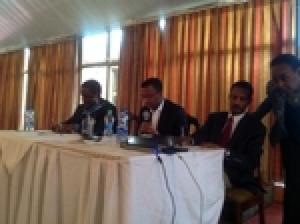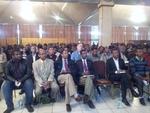Ethiopia One Step Ahead of the Ebola Virus
Addis Ababa. 6 August 2014 – A half-day orientation on Ebola virus disease outbreak preparedness and response organized by the Federal Ministry of Health (FMoH) took place yesterday in Addis Ababa. The orientation workshop was organized to orient health workers on the Ebola virus disease surveillance (case detection and reporting), risk factors, clinical signs and symptoms and precautions to be taken for infection prevention. More than 200 health workers from government and private hospitals, NGOs, health centers, health bureaus and sub-cities in Addis Ababa and Ethiopian Airlines Clinic attended the orientation. Also present were representatives from the World Health Organization (WHO), the US Center for Disease Control and Prevention (CDC) and Japan Embassy.
Speaking at the opening, Dr Pierre M’pele-Kilebou, WHO Representative to Ethiopia, said, “We need to make every effort to be well-prepared for this public health emergency. We don’t have to wait for Ebola.”
Following the outbreak in Liberia, Guinea and Sierra Leone, Ebola was declared to be a public health emergency in West Africa by the WHO Director General in July 2014, and countries with close travel and contact with affected countries were advised to strengthen preparedness and surveillance. The FMoH organized the orientation workshop taking heed of this declaration and also considering the fact that Ethiopian Airlines has flights to and from the affected countries.
Ebola virus disease is a severe, often fatal, illness that kills up to 90% of infected persons. It is one of the world’s most infective diseases. The infection is transmitted by direct contact with the blood, body fluids and tissues of infected animals or people. Severely ill patients require intensive supportive care. During an outbreak, those at higher risk of infection are health workers, family members and others in close contact with sick people and deceased patients. In the current outbreak in West Africa, 50-70% of persons infected with the disease have died.
Moreover, as part of enhancing the preparedness measures, the FMoH has developed a preparedness plan, designated an isolation unit and pre-positioned Personal Protective Equipment (PPE) for use by its frontline staff in high risk situations. Moreover, the FMoH’s Ethiopian Public Health Institute (EPHI), in collaboration with its partners has planned to conduct similar orientations and training in all regions of the country.
Useful links
WHO fact sheet on Ebola virus disease
Frequently asked questions on Ebola virus disease
More on Ebola virus disease
For more information, please contact Dr Admas Tefera, Preparedness, Integrated Surveillance and Response Programme Coordinator, WHO Ethiopia; email: admast [at] who.int (admast[at]who[dot]int) or Loza Mesfin Tesfaye, Communications Officer, WHO Ethiopia; email: admast [at] who.int (admast[at]who[dot]int)
PHOTOS: WHO Ethiopia/ Loza Mesfin Tesfaye





